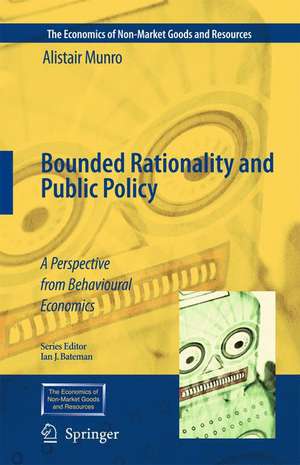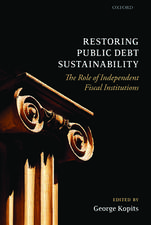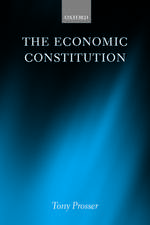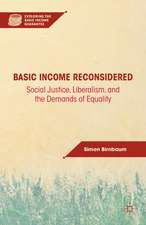Bounded Rationality and Public Policy: A Perspective from Behavioural Economics: The Economics of Non-Market Goods and Resources, cartea 12
Autor Alistair Munroen Limba Engleză Hardback – 23 iun 2009
| Toate formatele și edițiile | Preț | Express |
|---|---|---|
| Paperback (1) | 1218.83 lei 6-8 săpt. | |
| SPRINGER NETHERLANDS – 28 oct 2010 | 1218.83 lei 6-8 săpt. | |
| Hardback (1) | 1224.99 lei 6-8 săpt. | |
| SPRINGER NETHERLANDS – 23 iun 2009 | 1224.99 lei 6-8 săpt. |
Preț: 1224.99 lei
Preț vechi: 1493.90 lei
-18% Nou
Puncte Express: 1837
Preț estimativ în valută:
234.40€ • 244.73$ • 193.100£
234.40€ • 244.73$ • 193.100£
Carte tipărită la comandă
Livrare economică 04-18 aprilie
Preluare comenzi: 021 569.72.76
Specificații
ISBN-13: 9781402094729
ISBN-10: 1402094728
Pagini: 340
Ilustrații: XVI, 304 p.
Dimensiuni: 155 x 235 x 21 mm
Greutate: 0.65 kg
Ediția:2009
Editura: SPRINGER NETHERLANDS
Colecția Springer
Seria The Economics of Non-Market Goods and Resources
Locul publicării:Dordrecht, Netherlands
ISBN-10: 1402094728
Pagini: 340
Ilustrații: XVI, 304 p.
Dimensiuni: 155 x 235 x 21 mm
Greutate: 0.65 kg
Ediția:2009
Editura: SPRINGER NETHERLANDS
Colecția Springer
Seria The Economics of Non-Market Goods and Resources
Locul publicării:Dordrecht, Netherlands
Public țintă
ResearchCuprins
Anomalies.- Information, Learning and Markets.- Markets and Reference Dependent Preferences.- Welfare.- Public Policy and Bounded Rationality.- Standard Fiscal Policy and Merit Wants.- Agency and Dependency.- Tax Policy.- Framing Matters: Non-Standard Fiscal Policy.- Stated Preference and Non-Market Decisions.
Recenzii
From the reviews:
“Alistair Munro’s book … provides an important contribution to this emerging literature. The author has a broad scope and examines several implications of bounded rationality that are of interest for public economics. … several implications of bounded rationality that are relevant for environmental economists are addressed, mainly for non-market valuation research. … The material is accessible for researchers or graduate students who want to be introduced to the topic, while several chapters tackle more advanced issues that can be of interest for an expert audience.” (W. J. W. Botzen, Environmental and Resource Economics, Vol. 49, 2011)
“Alistair Munro’s book … provides an important contribution to this emerging literature. The author has a broad scope and examines several implications of bounded rationality that are of interest for public economics. … several implications of bounded rationality that are relevant for environmental economists are addressed, mainly for non-market valuation research. … The material is accessible for researchers or graduate students who want to be introduced to the topic, while several chapters tackle more advanced issues that can be of interest for an expert audience.” (W. J. W. Botzen, Environmental and Resource Economics, Vol. 49, 2011)
Textul de pe ultima copertă
The economist’s advice to society rests largely on a picture of citizens as infinitely rational beings, shrewd, calculating and above all consistent in their behaviour. But as the last thirty years of economic experiments and field work has revealed, humans are far from perfectly consistent. On the contrary, choices and preferences often seem highly sensitive to context. Systematic deviations from rationality – "anomalies" are widespread and they have been well-documented in the laboratory and the field. What then can the economist say about desirable public policies?
Bounded Rationality and Public Policy brings together the work of experimental economists and applies it to public economics. Experimental evidence on anomalies such as the endowment effect, anchoring and mental accounts is presented and critically appraised. The implications of bounded rationality for the efficient boundaries of the state are considered. The author argues that in general bounded rationality does not imply a larger optimal role for the state and indeed the converse may be true. New kinds of policies based on the framing and labeling of choices are discussed and their impact is analysed. The author also considers optimal tax and benefit policy and the best role for stated preference and other methods widely employed in non-market valuation.
Throughout this Work, the emphasis is on using models of human behaviour that are well-grounded in empirical evidence. The author shows that even when behaviour is not fully rational, economists have much to say about the design of public policy.
Bounded Rationality and Public Policy brings together the work of experimental economists and applies it to public economics. Experimental evidence on anomalies such as the endowment effect, anchoring and mental accounts is presented and critically appraised. The implications of bounded rationality for the efficient boundaries of the state are considered. The author argues that in general bounded rationality does not imply a larger optimal role for the state and indeed the converse may be true. New kinds of policies based on the framing and labeling of choices are discussed and their impact is analysed. The author also considers optimal tax and benefit policy and the best role for stated preference and other methods widely employed in non-market valuation.
Throughout this Work, the emphasis is on using models of human behaviour that are well-grounded in empirical evidence. The author shows that even when behaviour is not fully rational, economists have much to say about the design of public policy.
Caracteristici
Pioneers the theoretical analysis of public policy in a context of bounded rationality Brings together public economics and behavioural economics Surveys the behavioural anomalies most relevant in a public policy context Provides a new perspective on stated preference and environmental valuation


























